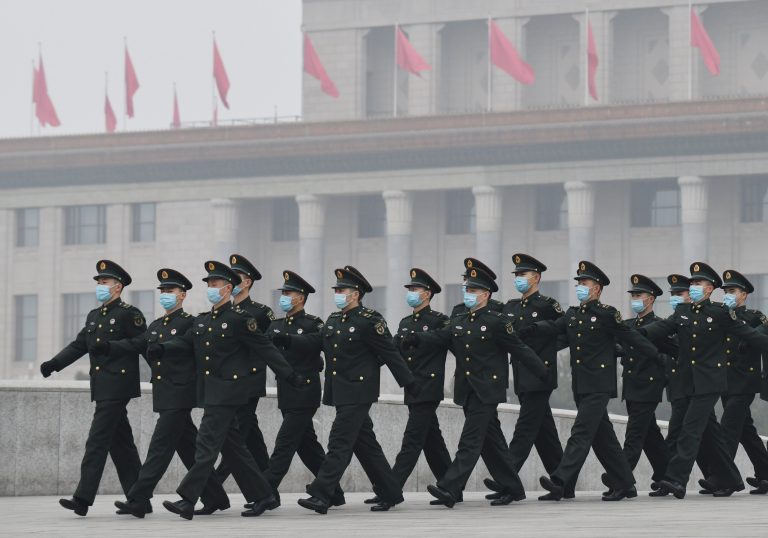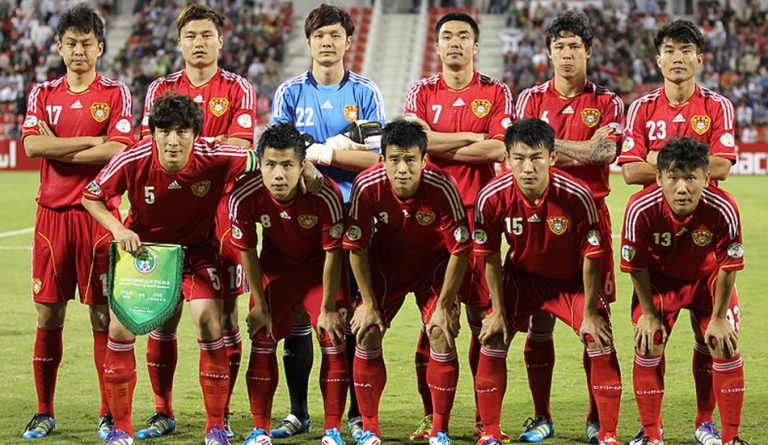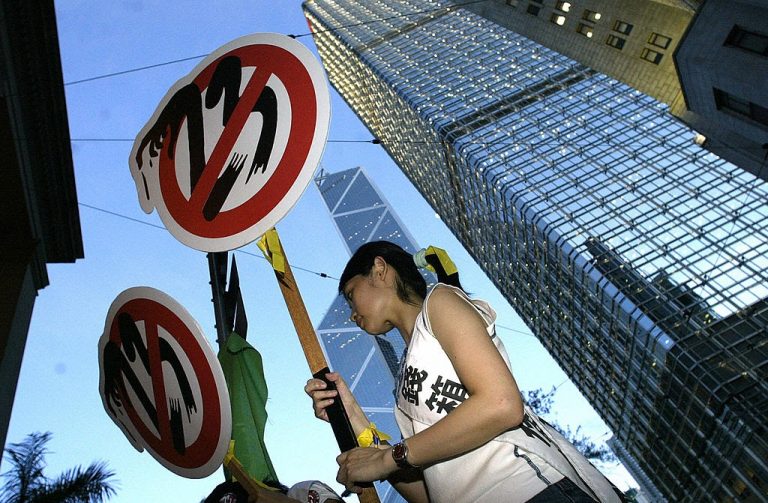News analysis
Delegates of the People’s Republic of China’s (PRC) rubber-stamp legislature and political advisory body met in Beijing for the annual “Two Sessions” meetings in March. At the week-long meetings of the National People’s Congress and the Chinese People’s Political Consultative Conference, senior officials delivered work reports for the previous year and laid out policy and work objectives for 2022.
The remarks, work reports, propaganda, policies, and data released at the Two Sessions, which were held from March 4 to March 11, reveal a regime struggling to keep its head above water amid crashing waves of crises.
Below are three important takeaways from the meetings.
1: The regime’s ‘stability maintenance’ will intensify as domestic problems mount
The various work reports indirectly affirmed what official economic data had been indicating for some time — rapid economic deterioration. China’s economic development faces the “triple pressures of shrinking demand, disrupted supply and weakening expectations,” premier Li Keqiang said in his government work report. After calling on the government to ensure the so-called “six stables,” “six guarantees,” and improve the people’s lives, Li announced a GDP growth target of just 5.5 percent, the lowest in 30 years.
Success
You are now signed up for our newsletter
Success
Check your email to complete sign up
Separately, the Supreme People’s Court work report noted 13,000 bankruptcy cases involving 2.3 trillion yuan in claims in 2021, another sign of economic trouble.
Food problems were also hinted at during the Two Sessions. Li Keqiang’s work report called on all local governments to “shoulder responsibility for safeguarding China’s food security” and ensuring that “the country’s ‘rice bag’ and ‘vegetable basket’ are well-filled” so that the regime has “a secure food supply for more than 1.4 billion Chinese people.”
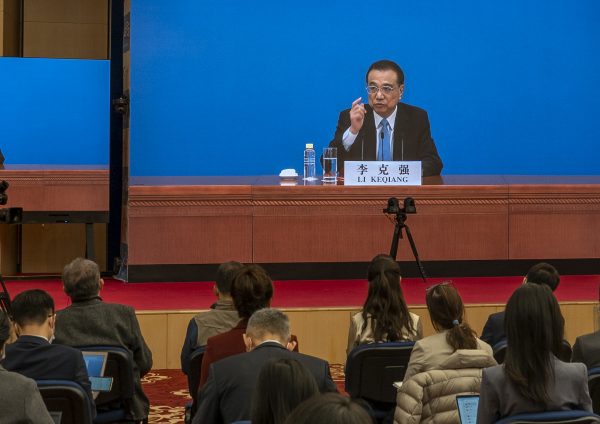
Minister of Agriculture and Rural Affairs Tang Renjian’s remarks to reporters a day after Li delivered his work report suggested that the regime could be looking at food shortages if supply issues are not addressed. China’s winter wheat crop in 2021 could be the “worst in history” because heavy rainfall delayed the planting of about a third of the normal wheat acreage, Tang said. He added, “This year’s grain production indeed faces huge difficulties.”
The Two Sessions further revealed Beijing’s concerns about growing anger over various social issues. Li Keqiang noted in his work report that “many shortcomings need to be addressed in areas important to the people’s lives,” and “social policies must stick to the bottom line of safeguarding the people’s lives.”
The Supreme People’s Court work report said that that sexual assault and the trafficking of women and children will be severely punished while judicial protections will be strengthened, a nod to the “Xuzhou chained woman” incident that broke out in late January and led to tremendous public uproar and calls for accountability. Beijing is no doubt aware that it must at least acknowledge societal problems and put on an appearance of addressing them lest its political legitimacy erodes into dangerous territory.
The dysfunctioning officialdom was another problem exposed at the Two Sessions. Li Keqiang noted “deficiencies in government work” in his report, including officials partaking in “formalism and bureaucratism,” officials being “out of touch with reality” and acting against the public will, and local governments adopting “one-size-fits-all” or “campaign-style” approaches in implementing policy.
READ MORE:
- Premier Li Keqiang Asks Officials to Avoid Communist-style ‘Bureaucratism’ as China’s Economic Crisis Worsens
- In Leaked Recording, Elite Chinese Scholar Laments Crippling Dysfunction of Communist Regime
Li’s report also slammed officials for having “shirked their responsibilities, failed to do their jobs, or behaved irresponsibly,” with some being derelict in their duties by disregarding serious infringements on the rights and interests of the people. “Corruption remains a common problem in some sectors,” he added.
The many domestic issues spotlighted during the Two Sessions is compelling the Chinese Communist Party (CCP) to focus on “stability maintenance” this year to keep things from spiraling out of control. Li Keqiang’s work report urged the government to “maintain stable macroeconomic performance, keep major economic indicators within a reasonable range, and maintain overall social stability.”
And in speaking to the delegations of the People’s Liberation Army (PLA) and the People’s Armed Police on March 7, Xi Jinping said that the military must be prepared to “assist local governments in maintaining overall social stability, deal with various emergencies in a timely and effective manner, maintain national security and stability, and complete various tasks assigned to it by the Party and the people.”
2: Geopolitical pressures threaten the security of the CCP
Beijing has been navigating an increasingly hostile geopolitical environment since its global domination agenda was exposed during the Trump years. The CCP’s adherence to “wolf warrior” diplomacy, gross human rights abuses in Xinjiang, and trampling of Hong Kong’s freedoms meant that countries continued to pressure the PRC after President Donald Trump left office.
International pressure against China ramped up just before the Two Sessions over Beijing’s continued support of Moscow after Russia invaded Ukraine on Feb. 24. Meanwhile, the impact of the coronavirus pandemic and government lockdowns on the global economy is contributing to China’s economic headwinds.
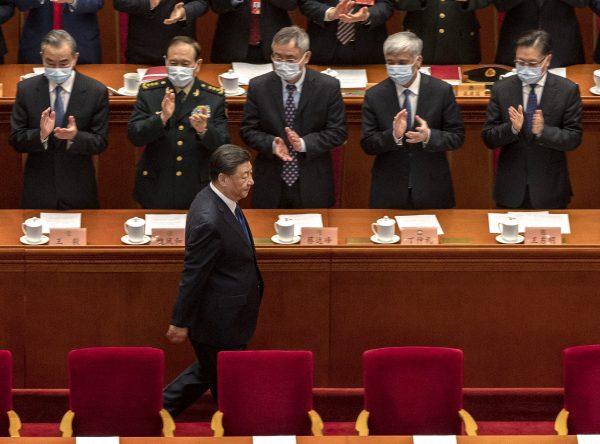
Li Keqiang noted in his government work report that the PRC’s external environment is “increasingly volatile, grave and uncertain.” The “complicated and challenging circumstances both in and outside of China, as well as many risks and challenges,” threaten regime security. Li added that the COVID-19 pandemic meant that world economic recovery “lacked drive” in 2021, with commodity prices “remaining high and prone to fluctuation.”
Global problems also meant the “sluggish” recovery of consumption and investment, greater difficulties in maintaining steady growth in exports, and an “inadequate” supply of energy resources and raw materials” last year. Further, many micro, small, and medium-sized enterprises and self-employed individuals are facing production and business operation troubles, as well as the “more formidable” task of stabilizing employment.
While Li did not mention it in his work report, the Russia-Ukraine war and the U.S. Federal Reserves’ interest rate increases will worsen the PRC’s economic situation this year. Beijing could also see increased global pressure over its support of Russia and feet dragging on climate change.
READ MORE:
- As Challenges Mount, China’s Xi Calls for ‘Self-Revolution’
- In 2022, Expect China’s Economy to Worsen Further
Xi Jinping, however, made it clear during the Two Sessions that international climate demands will not trump domestic priorities. In speaking to the Inner Mongolia delegation on March 5, Xi said, “The green transition is a process, not a one-shot thing … Being rich in coal and poor in oil and gas is China’s energy situation, and it is difficult to make fundamental changes from the coal-based energy structure in the short-term.”
The Chinese leader added that the regime must “also ensure the security of energy, food, and industrial and supply chains, as well as the normal life and work” of the Chinese people. “We can’t be detached from reality … We can’t discard what’s feeding us now while what will feed us next is still not in hand,” he said.
3: The CCP downplays its Taiwan ‘reunification’ ambitions
The Two Sessions saw the CCP soften its rhetoric on achieving “reunification” with Taiwan after years of “wolf warrior” aggressiveness on the topic.
Li Keqiang’s government work report only spent one paragraph on Taiwan where it called for “peaceful growth of relations across the Taiwan Strait and the reunification of China.” The paragraph did not contain fighting phrases like “do not commit to renouncing the use of force” that were thrown out in recent years.
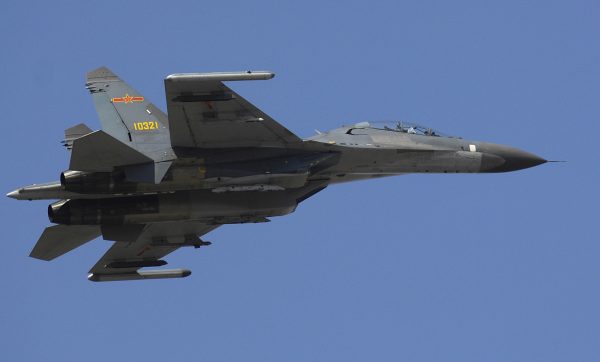
READ MORE:
- CCP’s Beijing Winter Olympics Propaganda Fest Marred by Controversy
- Does the CCP’s New ‘Historical Resolution’ Give Xi More Power? Not Really.
Wang Yang, head of the CPPCC and deputy head of the Central Leading Group for Taiwan Affairs, lightly touched on Taiwan in his work report in reviewing the political advisory body’s cross-strait forums in 2021 and calling for “strengthening the great unity of Chinese sons and daughters in their struggle.”
NPC head Li Zhanshu’s mention of Taiwan in his work report was limited to clarifying “China’s solemn position” and “engagement in struggle” on a range of issues, including Taiwan, in discussions with foreign legislative organizations.
Xi Jinping urged the military and the armed police to “struggle, prepare, and build” and have “war preparedness” during the Two Sessions. However, Xi made those remarks when also addressing domestic stability, which suggests that his call for “war preparedness” is likely more internally than externally focused.
The 2022 defense budget unveiled at the Two Sessions also hints that the Xi leadership is presently not interested in a Taiwan invasion. The 1.45 trillion yuan (about $230.16 billion) defense budget was an increase of 7.1 percent from the previous year, a higher growth rate than the 6.8 percent in 2021 and the 6.6 percent in 2020. In accounting for rising inflation and the greater allocation of funds to improving military welfare, however, Beijing appears to be seeking to maintain defense spending at current levels, rather than boost spending in preparation for war.
Larry Ong is a senior analyst with New York-based political risk consultancy SinoInsider. He was part of the SinoInsider team that forecasted the 19th Party Congress and 2018 Two Sessions personnel reshuffles with a high degree of accuracy.



